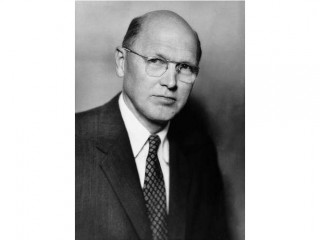
Dickinson W. Richards biography
Date of birth : 1895-10-30
Date of death : 1973-02-23
Birthplace : Orange, New Jersey, U.S.
Nationality : American
Category : Science and Technology
Last modified : 2011-12-16
Credited as : physician and physiologist, Cardiac catheterization, Nobel laureate
0 votes so far
Fascinated by German physician Werner Forssmann's account of self-catheterization, physician and physiologist Dickinson W. Richards and his colleague André F. Cournand devised a technique to catheterize the heart, and studied the effects of this treatment in cases of traumatic shock, congenital heart diseases, heart failure, and chronic cardiac and pulmonary diseases.
For this research, Richards, Cournand, and Forssmann shared the 1956 Nobel Prize for Physiology or Medicine. For several years he edited The American Review of Tuberculosis, and he served as a senior editor for The Merck Manual of Diagnosis and Therapy, one of the most widely respected medical texts.
His friend Cournand described Richards as "modest to the point of shyness". He dropped out of Yale to serve in the artillery in World War I, and when he returned to the academic life he married his first serious girlfriend, who had been his lab assistant.
Richards received many other honors, including the John Phillips Memorial Award of the American College of Physicians in 1960, the Chevalier de la Legion d'Honneur in 1963, the Trudeau Medal in 1968, and the Kober Medal of the Association of American Physicians in 1970.
















